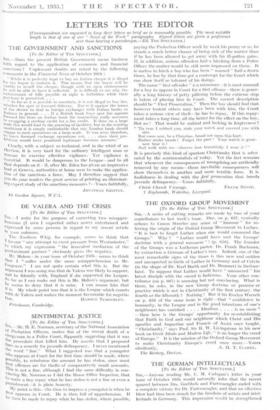THE OXFORD GROUP MOVEMENT
[To the Editior of Tau spEcTATort.] gra,—A series of cutting remarks are made by two of your contributors to last week's issue. One, on p. 657, cynically. refuses to Canon Streeter any sense of " humour for re- ferring the origin of the Oxford Group Movement to Luther. " It is best to forget Luther when one would commend the Groups." Why ? " Luther would have met the Groups' doctrine with a general massacre " ! (p. 058). The founder of the Groups was a Lutheran pastor, Dr. Frank Buchman, by extraction a German of Luther's race. Indeed, one of the most remarkable signs of the times is this new and sudden and unexpected re-birth of Luther in Germany and of Calvin (in the shape of Dr. Karl Barth and Dr. Brunner) in Switzer- land. To suppose that Luther would have " massacred " his latest disciple with the sword is ludicrous. Your other con- tributor (on p. 667) is amusing but not convincing. What is there, he asks, in the new Group doctrine or promise or practice which is not in Christianity of the first century, the' fourth or the fifteenth ? Nothing But if Sir Evelyn Wrench on p. 656 of the same issue is right—that " eonlidenee in humanity, in the League and in the good intentions of one's neighbours has vanished . . . . Idealism . • . is no more " —then here is the Groups' opportunity for re-establishing that Faith in God and our neighbour which Christ. and His apostles and Augustine and Francis of Assisi once taught.
" Christianity," says Prof. Sir H. W. Livingstone in his new book on Greek Ideals and Modern Life, " is no longer the creed of Europe." It is the mission of the Oxford Group Movement to make Christianity Europe's creed once more.—Yours


























































 Previous page
Previous page